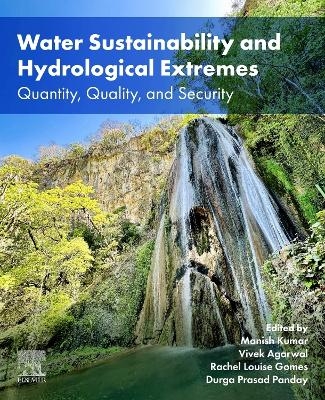
Water Sustainability and Hydrological Extremes
Elsevier - Health Sciences Division (Verlag)
978-0-443-21499-8 (ISBN)
- Noch nicht erschienen (ca. November 2024)
- Versandkostenfrei
- Auch auf Rechnung
- Artikel merken
This thorough guide serves as a pillar to postgraduate students and researchers as it’s centered on discovering remediation and natural attenuation of hydrological extremes with a special emphasis on present and future challenges.
Manish Kumar is a professor and head of the ‘Sustainability Cluster’ at School of Engineering, UPES, Dehradun, India. He is a Fellow of the Royal Society of Chemistry (FRSC). He earned his Ph.D. in Environmental Engineering from the University of Tokyo, Japan. He has been the recipient of Water Advanced Research and Innovation (WARI) Fellowship, Japan Society for the Promotion of Science (JSPS) foreign research fellowship, Brain Korea (BK)-21 post-doctoral fellowship, Monbukagakusho scholarship, Linnaeus-Palme stipend from SIDA, Sweden, and Research Fellowship from CSIR, India and others. He supervised 8 Ph.D. thesis and published >150 international peer-reviewed journal papers, and has 20+ years’ research/teaching experience with H-index =43, i10-index=124 with total citation (~7000)-Google Scholar. He is the core committee member of the International Water Association (IWA)-India Chapter. He is the one of the illustrious members of global collaboration on wastewater-based epidemiology of COVID-19. Vivek Agarwal is currently employed as Lecturer at the School of Engineering, Northumbria University, Newcastle, United Kingdom. Before this, he pursued his PhD from the University of Nottingham in Geospatial Environment Engineering. His thesis title was “Study of groundwater properties and behavior using geospatial tools, and he was awarded “the best PhD Thesis award for his doctoral thesis. Dr. Agarwal has published 10+ international publications. He has a wide-ranging research interest in subjects related to civil engineering and interdisciplinary areas. His expertise is in remote sensing, GIS, water supply, hydraulics, fluid mechanics, water quality and sewage pollution. He intends to combine NASA’s GRACE gravity anomalies relating and InSAR land subsidence data relating them to groundwater quantity and quality variations. The aim of the research is to find solutions to the Climate Emergency by better understanding and managing the earth’s groundwater resources. Rachel Gomes is a Professor in Chemical and Environmental Engineering with research into intelligent resource use in process environments, with a particular focus on waste/water treatment, water reuse, and process manufacturing for emerging pollutants and pollutant-to-product opportunities. She is head of the Food, Water, Waste (FWW) Research Group and leads the University of Nottingham Interdisciplinary Research Cluster, Water Works. Prof. Rachel has a PhD from Imperial College London and received the Wellcome Trust Value in People Award and was one of the '100 women, 100 visions' celebrating women scientists and engineers. Prof. Rachel has several funding portfolios from Research Councils, Charities and Industry Prof. Rachel have expertise in process resilience, circular economy, wastewater treatment, process manufacture, analytics, and modelling. She has been recognized with an MBE (Member of the Order of the British Empire (MBE)) for her services to research and to education in the 2022 Birthday Honors List. Durga Prasad Panday is a faculty at Sustainability Cluster, UPES. He is a post-graduate in Water Resources Engineering from IIT Delhi. He has twice qualified the GATE exam with 99 percentiles. He has published several research articles including journal papers, book chapters and conference proceedings. His area of interest is Water resources modelling, Hydroclimatic extremes, Game-theoretic conflict resolution techniques, watershed management, water quality modelling and GIS. He has a teaching experience of 7 years. He is actively engaged in consultancy works in water resources and quality modelling.
Section 1: Present and historical approach
1. How much is too much or too little? Decadal climatic variation in 21st century.
2. Spatio-temporal variation in the water cycle: Case Studies of different geographical locations.
3. Hydrological modeling on spatio-temporal variation.
4. Unveiling the flow: A comprehensive exploration of virtual water
trade globally and in India.
Section 2: Climate Extremes: Dimensions
5. Statistical variability of precipitation and the detection approaches.
6. Planning of water supply systems: Role of climatic extremes.
7. Understanding the spatiotemporal influence of hydrological extremes.
8. Relationship of water supply, irrigation, and droughts: overview and synthesis.
Section 3: Quality-Quantity Bridge
9. Climate change, pollution, urbanization, and pandemic in the context of hydrological extremes.
10. Effects of anthropogenic imprints on water sustainability and hydrological extreme events.
11. Flood-resilient water supply and sanitation systems: Global case-studies.
12. A probable framework for flood-induced risk evaluation for water
supply, sanitation and hygiene.
13. The impacts of drought on the available water quality.
Section 4: Sustainability
14. United Nations Sustainable Development Goals in the context of hydrological extremes.
15 Stakeholders participation and groundwater management: Raising the wareness.
16. Options and strategies for managing droughts: Case studies from agro-ecological regions.
17. Exploring the role of digital technologies in promoting circular economy practices in the Indian agriculture sector.
| Erscheint lt. Verlag | 1.11.2024 |
|---|---|
| Verlagsort | Philadelphia |
| Sprache | englisch |
| Maße | 191 x 235 mm |
| Gewicht | 450 g |
| Themenwelt | Naturwissenschaften ► Biologie ► Ökologie / Naturschutz |
| Technik ► Umwelttechnik / Biotechnologie | |
| ISBN-10 | 0-443-21499-9 / 0443214999 |
| ISBN-13 | 978-0-443-21499-8 / 9780443214998 |
| Zustand | Neuware |
| Haben Sie eine Frage zum Produkt? |
aus dem Bereich


